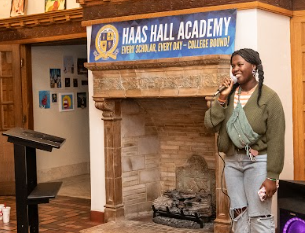By Emerson Matushek
ROGERS, ARK. — Members of “Footnotes” started off their writing season for issue ten of their award-winning literary magazine with an open mic night at the Rogers campus.
The “Footnotes” literary magazine is a collaboration between scholars from each Haas Hall campus, containing pieces of literature, poetry and visual art. Current editor-in-chief Kaylah Atungulu describes the goal of “Footnotes,” stating how, “I think that we’re all, as students, going through a lot, and a lot of us don’t have a real outlet to express ourselves, so the goal of ‘Footnotes’ is to give those scholars a space where they can do that.”
On Jan 26, 2024, scholars shared poetry and even musical performances in front of friends, family, and other members of the “Footnotes” team. Having an event at the Rogers campus was something new for the group. “My goal as an editor is to expand the ‘Footnotes’ team and really get a bunch of different campuses involved, rather than it being Springdale central,” says Atungulu, “so I think that having a lot of editors from different campuses really helped the turn-out.”
This event was also a way for “Footnotes” members to get a better idea of the teams they’ll be working with for this issue. Rogers campus presenter Kamdyn Besett stated how, “It resonated with me that they were people like me, and I’ve never really had that big of a group of people that had the same passion as me, so it was really nice.”
Team leaders for the art, poetry and prose divisions were able to talk one-on-one with their other team members. “It’s hard to communicate that whenever I’m this disembodied text message kind of floating around on their phones and computers,” Atungulu explains. “I just really want them to see my face and realize that, at the end of the day, I’m just a girl, and I’m just a scholar who wants to make the most beautiful literary magazine possible.”
The “Footnotes” literary magazine has offered scholars a way to share their work with the publication of a physical book. Atungulu recommends participating, saying how, “Footnotes” has given me one of the most beautiful communities in my life.”
“It’s fun to read people’s work because you get to see people’s inner thoughts,” Besett adds. “You don’t realize how personal poems can truly be until you read some of the submissions.”
When asked how scholars can submit their art and writing, Atungulu responded, “Just write what your heart wants to say, and then email Haaslitmag@gmail.com, then put whether or not it’s prose, visual art or poetry, you put your name, you put what campus you’re at in the subject line and then you attach your doc, and that’s really it.” Scholars across all four campuses can submit work until around May.
As part of the “Footnotes” staff, scholars are expected to critique and edit other people’s work for publication. Atungulu describes the pieces included in a standard edition, saying, “Obviously we take poetry, prose and visual art, but I don’t really think that ‘Footnotes’ has boundaries because I don’t believe that art should have boundaries. Of course, within school-appropriate bounds, but there are ways to express every emotion, and, so, in a typical ‘Footnotes’ edition it’d just be people being people.”
Many people on staff are looking forward to the future of “Footnotes.” When asked if she’d continue working on the staff, Besett stated, “Oh, most definitely. Kaylah, our editor-in-chief, is a senior, so she’s going to be passing on here soon, so there’s gonna be people there to continue that and I wanna be one of those people.”

